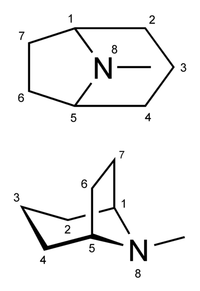Substituted tropanes
This article is a stub. As such, it may contain incomplete or wrong information. You can help by expanding it. |
Substituted tropanes (or simply tropanes) are a group of psychoactive compounds that include a tropane ring in their structure. Prominent examples include certain stimulants like cocaine and its derivatives as well as deliriants like atropine and scopolamine.
Chemistry
Tropanes are molecules which contain a substituted tropane ring in their structure. Tropane is a nitrogen-containing bicyclic organic molecule which consists of a piperidine and pyrrolidine ring fused at carbons R1 and R5 along with an additional methyl substitution at RN. It is mainly known for a group of alkaloids derived from it. Tropane alkaloids are commonly substituted at R3 with an ether bridge (as seen in scopolamine, atropine, hyoscyamine, and cocaine). Synthetic analogs of tropane alkaloids also exist, such as the phenyltropanes. They are not considered to be alkaloids per definition.
Pharmacology
This pharmacology section is incomplete. You can help by adding to it. |
Tropane alkaloids are mostly anti-cholinergics (antagonistic action on acetylcholine receptors) or stimulants (prevention of dopamine reuptake).
List of substituted tropanes
| Compound | R2 | R3 | R6 | R7 | Structure |
|---|---|---|---|---|---|
| Atropine | H | OCOCH(CH2OH)C6H5 | H | H | |
| Hyoscyamine | H | OCOCH(CH2OH)C6H5 | H | H | |
| Scopolamine | H | OCOCH(CH2OH)C6H5 | O- | - | |
| Cocaine | CO2CH3 | OCOC6H5 | H | H | |
| Troparil | CO2CH3 | C6H5 | H | H | |
| RTI-111 | CO2CH3 | C6H3Cl2 | H | H |
External links
References
This article does not cite enough references. You can help by adding some. |
